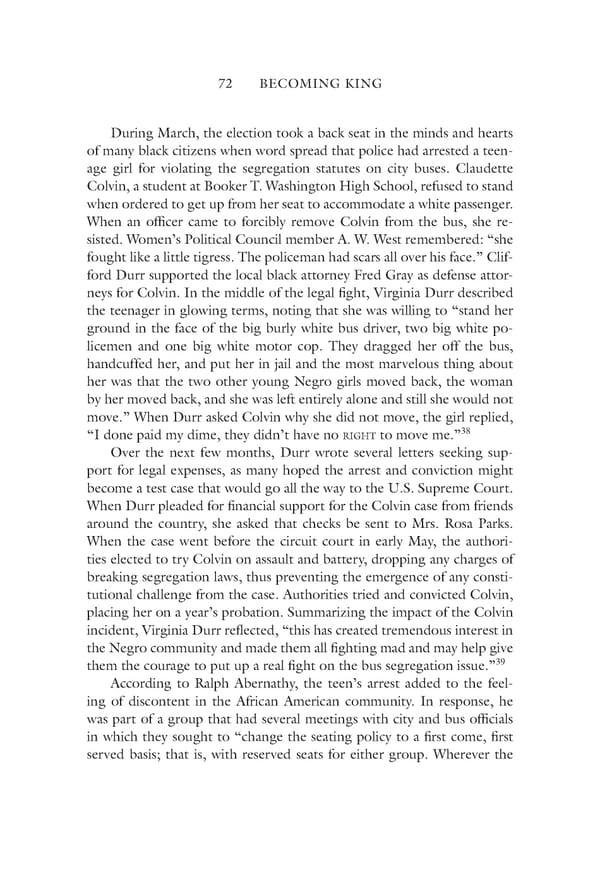72 BECOMING KING During March, the election took a back seat in the minds and hearts of many black citizens when word spread that police had arrested a teen- age girl for violating the segregation statutes on city buses. Claudette Colvin, a student at Booker T. Washington High School, refused to stand when ordered to get up from her seat to accommodate a white passenger. When an officer came to forcibly remove Colvin from the bus, she re- sisted. Women’s Political Council member A. W. West remembered: “she fought like a little tigress. The policeman had scars all over his face.” Clif- ford Durr supported the local black attorney Fred Gray as defense attor- neys for Colvin. In the middle of the legal fight, Virginia Durr described the teenager in glowing terms, noting that she was willing to “stand her ground in the face of the big burly white bus driver, two big white po- licemen and one big white motor cop. They dragged her off the bus, handcuffed her, and put her in jail and the most marvelous thing about her was that the two other young Negro girls moved back, the woman by her moved back, and she was left entirely alone and still she would not move.” When Durr asked Colvin why she did not move, the girl replied, 38 Right to move me.” “I done paid my dime, they didn’t have no Over the next few months, Durr wrote several letters seeking sup- port for legal expenses, as many hoped the arrest and conviction might become a test case that would go all the way to the U.S. Supreme Court. When Durr pleaded for financial support for the Colvin case from friends around the country, she asked that checks be sent to Mrs. Rosa Parks. When the case went before the circuit court in early May, the authori- ties elected to try Colvin on assault and battery, dropping any charges of breaking segregation laws, thus preventing the emergence of any consti- tutional challenge from the case. Authorities tried and convicted Colvin, placing her on a year’s probation. Summarizing the impact of the Colvin incident, Virginia Durr reflected, “this has created tremendous interest in the Negro community and made them all fighting mad and may help give 39 them the courage to put up a real fight on the bus segregation issue.” According to Ralph Abernathy, the teen’s arrest added to the feel- ing of discontent in the African American community. In response, he was part of a group that had several meetings with city and bus officials in which they sought to “change the seating policy to a first come, first served basis; that is, with reserved seats for either group. Wherever the
 Becoming King: Martin Luther King Jr. Page 92 Page 94
Becoming King: Martin Luther King Jr. Page 92 Page 94